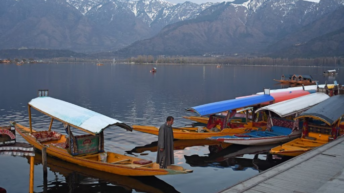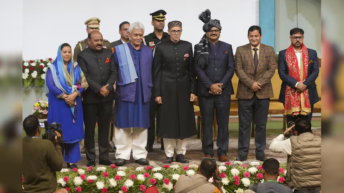|
Listen to article
Getting your Trinity Audio player ready...
|

The Pakistani newspaper Dawn has reported that during his interaction with the press, Pakistani Prime Minister Imran Khan said that “talks with India can be resumed only if New Delhi restores Kashmir’s pre-Aug 2019 status”. He contends that holding talks without India restoring the pre-August status for J&K would tantamount to the betrayal of Kashmiris. He added that Kashmiris will infer that Pakistan is prepared to compromise with India’s action of 5 August 2019 in Kashmir,
It will be recollected that only a month or more back, Pakistan’s Army Commander General Bajwa while addressing the cadets had said that India and Pakistan should bury the past bitter memories and work on a new road map that would lead to the establishment of peace in the region.
Such utterances rarely come from the other side of the border and more especially from the Army chief. The power and role of the Pakistan army in running its sway over major policy matters, external as well as internal, is not hidden from anybody and hence there is no point in repeating it.
Political commentators have blackened reams of papers in trying to interpret and analyse what and why General Bajwa said what nobody ever expected from him to say. Whether he had taken the Prime Minister Imran Khan into confidence or not is somewhat immaterial because the Prime Minister usually administers the country via GHQ.
The undercurrent of General Bajwa’s biting the bullet is that he wanted to convey a subtle message to the Pakistani Foreign Minister Shah Mahmud who has become very vociferous on Kashmir and has begun to do haranguing on various platforms that there is what he calls “genocide of Muslims” in Kashmir by the Indian army since 5 August 2019 when the Indian Parliament abrogated Article 370 and 35-A which allowed J&K a special status in the Indian Constitution.
General Bajwa and the think-tank in the Pak army as well as Imran Khan know that the Foreign Minister of Pakistan is trying to bite more than what he can chew. Be it the OIC, or Pak-Turkey bilateral relations or any platform of the UN and its subsidiary bodies, Shah Mahmud has only one point agenda which is bringing a charge sheet against India for all imaginable oppression and suppression of the Indian Muslims in general and of those in Kashmir in particular. Of late he has been trying to project himself as the spokesman of Indian Muslims, Kashmiri Muslims, and Palestinian Muslims saying they are under the control of non-Muslim regimes.
May we ask this self-styled spokesman of the Muslims world over what he has to say about the Humudu’r Rahman Report on the defeat of Pakistan in the 1971 war over Bangladesh? The report says that nearly 3 million Bengalis (mostly Muslims) were massacred by the retreating Pakistani army and about a million Bengali women were raped by the Pakistani soldiers. Humudu’r Rahman was the Chief Justice of Pakistan who headed the inquiry commission. Is a country that has its hands drenched in human blood justified in calling itself the spokesman of the Muslims of the world?
Quite strangely the Pakistani Foreign Minister does not include 2.5 crore Uighur Sunni Muslims in his list of oppressed Muslims around the globe. Why does he exclude them? It is so because they are under the control of the “Iron brother” against whom Shah Mahmud has no guts to raise his voice. Leave aside raising of the voice, Pakistan’s is among the Muslim governments which wrote a letter of appreciation to the Chinese President praising him for meting out “just and humanitarian” treatment to the Sunni Uighurs of Xinjiang. This is when the world press reported that millions of Uighurs have been removed from their native homes and enrolled in concentration camps like prisoners. There they are being brainwashed and trained in the Han cultural ambit and advised to integrate with the Han culture which is the paramount culture of China.
The Kashmir Reorganization Act of August 5, 2019, will be entering the third year soon. During these three years, there has not been a single demonstration at any place in the Union Territory against the Reorganization Act. Not a single bullet had to be fired and not a single lathi-charge had to be indulged in. All this shows that most people in Kashmir understood that Article 370 was a big impediment in the path of Kashmir’s freedom and at the same time, it has been made the motive for recurrent disruption, strikes and lockdowns by the vested interest.
Who introduced Article 370 and 35-A in the Indian Constitution? It was the people of India through their elected representatives in the Parliament. Who abrogated these Articles? It was the people of India through their representatives in the Parliament. What is the problem for Imran Khan?
Yes, of course, the Gupkar gang has been speaking of the restoration of the pre-August 2019 status. The said gang has been trying to sell their story to the world media, to the western countries, to the OIC and the Islamic bloc. It is so because they have entrenched interests in restoring the old status. The interest is that they are not prepared to give an account of the huge grants they received from the Centre under the category of developmental projects. Wherefrom have the ex-ministers been able to amass enormous wealth and acquire mind-boggling properties not only in India but also in the US, France, UK, Dubai etc. How come day in and day out the ED conducts raids on the mansions of these people and seizes huge amounts of cash, jewellery, priceless estates, expensive cars and other luxury items? Wherefrom has this windfall come? The Gupkar gang is lamenting the loss of the source of undefined monies and not the abrogation of Article 370 etc.
These people in their craving for self-aggrandizement tried to forge unity among various political groups under the patriarchy of Dr Farooq Abdullah. The balloon burst midway through its maiden flight and now each of the confederating group is trying to swim ashore the turbulent waters. They are vocal in talking of suppression of the rights of Kashmiris and the Pakistani leadership imitates them, thinking the Kashmiri separatists will appreciate it. But only the other day, Mr Altaf Bukhari, the leader of the Apni Party, very frankly advised the parents in Kashmir to stop their children and youngsters from joining the militancy and getting killed for nothing.
Pakistan leaders are only daydreaming. They have no courage to spell out the true story. The reality is that under the operation All Out, a large number of militants affiliated with various terrorist groups in Pakistan have been liquidated. The local informers have played a significant role in identifying and tracking them down. The financial and weapons supplies to the active militants have largely dried out. Border crossing has been checked to a great extent. What is more depressing for Pakistan terrorist leaders is that the ceasefire is holding and their reinforcement has been cut down drastically.
Before concluding, it must be said that General Bajwa has been categorically told by his friends and well-wishers in the Pentagon that the only way of overcoming economic downslide for Pakistan is to mend fences with New Delhi, forget Kashmir and explore the huge prospect of trade and commerce with India. He has been told that the Indo-Pacific strategy is not what Pakistan and China might see as a counter-move to CPEC or China’s BRI programme. The Indo-Pacific policy responds to the 21st century compulsion of multilaterally preserving and promoting democracy in the face of hegemonic totalitarian trends.






Add comment